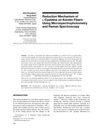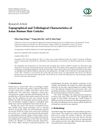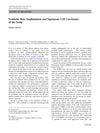 April 2024 in “Current journal of applied science and technology”
April 2024 in “Current journal of applied science and technology” The organic hair ointment is safe, promotes hair growth in male rabbits, and has good stability and pH for human use.
[object Object]  10 citations,
December 2015 in “Clinics in Dermatology”
10 citations,
December 2015 in “Clinics in Dermatology” Diabetes can lead to blindness and skin problems, and managing blood sugar and blood pressure is crucial to prevent these complications.
 10 citations,
January 2012 in “Journal of biomedical optics”
10 citations,
January 2012 in “Journal of biomedical optics” Melanin density affects hair color, and this method can help in cosmetic assessments and diagnosing hair diseases.
 29 citations,
August 2005 in “Biopolymers”
29 citations,
August 2005 in “Biopolymers” L-cysteine slows down the breaking of bonds in hair due to electrostatic interactions.
 January 2017 in “Journal of Cosmetics, Dermatological Sciences and Applications”
January 2017 in “Journal of Cosmetics, Dermatological Sciences and Applications” Chinese women's hair gets thinner and grayer with age, and scalp conditions change, especially after 40.
 December 2011 in “Asia-Pacific biotech news”
December 2011 in “Asia-Pacific biotech news” In 2011, there were major scientific breakthroughs in cancer treatment, immunity, Parkinson's, virus simulation, schizophrenia, hair growth, lung cancer, and medical grafts.
 3 citations,
January 2015 in “Mathematical problems in engineering”
3 citations,
January 2015 in “Mathematical problems in engineering” Hair damage increases significantly with higher temperatures and longer heating times.
 January 1963 in “Stain technology”
January 1963 in “Stain technology” Ziehl-Neelsen's stain helps identify different parts of hair in sheep and goats.
 December 2022 in “Proceeding Bengkulu International Conference on Health”
December 2022 in “Proceeding Bengkulu International Conference on Health” Celery extract hair gel at 5% concentration is best for making hair gel.
 9 citations,
May 2005 in “Facial plastic surgery”
9 citations,
May 2005 in “Facial plastic surgery” Laser hair removal can be safe and effective for dark-skinned individuals with the right laser settings.
 March 2005 in “Journal of The American Academy of Dermatology”
March 2005 in “Journal of The American Academy of Dermatology” Herbal extract improves hair growth in female pattern baldness.
 March 2005 in “Journal of the American Academy of Dermatology”
March 2005 in “Journal of the American Academy of Dermatology” Bexarotene 1% topical gel helped some patients with alopecia areata regrow hair.
 1 citations,
January 2013 in “Chronicles of young scientists”
1 citations,
January 2013 in “Chronicles of young scientists” Immuno-cosmeceuticals from chicken egg yolk can effectively repair and improve damaged hair.
5 citations,
August 2021 in “Journal of drug delivery and therapeutics” The herbal shampoo with fermented rice water is safe and effective for reducing hair fall.
 2 citations,
September 2023 in “Scientific reports”
2 citations,
September 2023 in “Scientific reports” The nanocomposite films with vitamins and nanoparticles are promising for fast and effective burn wound healing.
 July 1997 in “Journal of Cutaneous Medicine and Surgery”
July 1997 in “Journal of Cutaneous Medicine and Surgery” Finasteride significantly increases scalp hair and prevents hair loss in young and middle-aged men.
188 citations,
June 1998 in “Molecular cell” Researchers created a mouse with the same mutation as humans with trichothiodystrophy, showing similar symptoms and confirming the condition is due to defects in DNA repair and gene activity.
 June 2021 in “Research Square (Research Square)”
June 2021 in “Research Square (Research Square)” The exact identity of skin stem cells and how skin cells differentiate is not fully known.
 October 2012 in “Humana Press eBooks”
October 2012 in “Humana Press eBooks” Grape seed extract is good for skin care, with antioxidant, anti-inflammatory, and anti-cancer effects.
 May 2024 in “Journal of drug delivery science and technology”
May 2024 in “Journal of drug delivery science and technology” Exosomes show promise for treating skin diseases and improving skin regeneration.
1 citations,
May 2024 in “Applied Sciences” Cordyceps militaris is a promising, cost-effective medicinal fungus with health benefits and efficient production methods.
 1 citations,
May 2023 in “Research journal of pharmacognosy and phytochemistry”
1 citations,
May 2023 in “Research journal of pharmacognosy and phytochemistry” Herbal hair serum with natural ingredients can effectively treat common hair problems.
[object Object] 41 citations,
May 2005 in “International Journal of Cosmetic Science” Human hair contains various lipids that vary among individuals and help protect the hair.
 August 2021 in “Annals of pathology and laboratory medicine”
August 2021 in “Annals of pathology and laboratory medicine” Most skin tumors in the study were benign, with squamous cell carcinoma being the most common malignant type.
 42 citations,
April 2021 in “Journal of clinical pharmacology”
42 citations,
April 2021 in “Journal of clinical pharmacology” Baricitinib helps treat several diseases, including COVID-19, but has side effects and needs careful monitoring.
February 2024 in “Medicina” AFM can diagnose hair disorders by revealing detailed hair surface changes.
 207 citations,
January 2011 in “Dermatologic Therapy”
207 citations,
January 2011 in “Dermatologic Therapy” Laser hair removal is the most requested cosmetic procedure and has become a scientifically-based treatment suitable for all skin types.
 June 2018 in “International journal of trend in scientific research and development”
June 2018 in “International journal of trend in scientific research and development” The review explains how hair products work and the science of different hair types to help improve hair care research.
 36 citations,
June 2009 in “Nanomedicine”
36 citations,
June 2009 in “Nanomedicine” Fullerene nanomaterials help hair grow faster and increase hair follicles.
 2 citations,
August 2012 in “Aesthetic Plastic Surgery”
2 citations,
August 2012 in “Aesthetic Plastic Surgery” The letter argues that blaming synthetic hair implants for scalp cancer based on one report is biased and possibly coincidental.

























